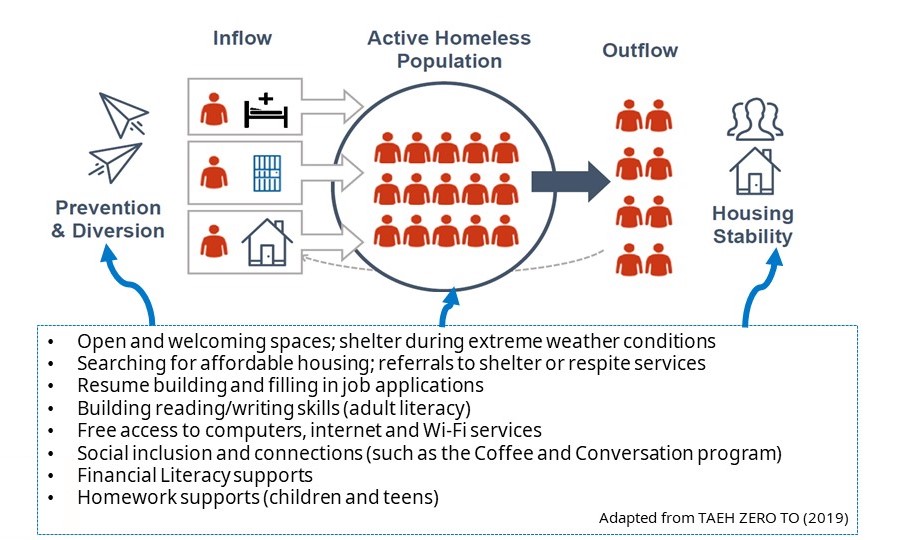The role of public libraries in supporting their community, especially vulnerable persons is nothing new. For people experiencing homelessness, libraries provide relief during times of extreme weather, a place to relax, connect and receive supports. Libraries can function as enriched spaces by offering opportunities to spend the day unnoticed by others, and legitimating their presence in prime rather than marginal spaces. Library access is also associated with the cultivation of social capital (Goulding 2004); it provides opportunities for fostering relations between diverse community members, civic participation and engagement (Alstad and Curry 2007).
Toronto Public Library (TPL) is the world’s busiest public library system, with a network of 100 branches. Last year, we had more that 17 million visits to our branches and 29 million virtual visits. In addition, more than 1 million participants attended over 46,000 library programs. Through TPL services and programs, Torontonians from all walks of life have increased opportunities for growth and success, as well as stronger connections to each other and their communities.
At the 2019 Canadian Alliance to End Homelessness (CAEH) Conference, my colleague Richard and I presented on the role that public libraries can play in supporting social service and community agencies, as well as people experiencing homelessness. It was a great opportunity for us to connect, learn from others, and raise awareness of the role our respective library systems play in the community.
Here are some of the FREE programs and services that libraries like Toronto Public Library provide:

Open and Welcoming Spaces
- Our spaces serve as warming and cooling centres in times of extreme weather conditions, providing refuge and shelter from the elements
- Libraries provide opportunities for connection and social inclusion. Our Coffee and Conversation program provides an opportunity to reduce social isolation, connect with community services and learn more about what the library offers – all served with a warm cup of coffee (or tea!)
- Spaces are open to everyone - regardless of their background, socio-economic status, or whether or not they have a place to live
Access to Technology and Digital Literacy Skills
- Public Libraries provide access to free technology services that help people stay connected to their loved ones, such as access to computers, the internet and Wi-Fi
- Our Wi-Fi Hotspot Lending program supports low income families by providing them with internet access for 6 months
- Computer Classes provide opportunities to build digital literacy skills, such as searching the internet, creating an email account and common programs like Word and Excel
Accessible, Knowledgeable and Approachable Staff
- No matter the question, library staff are trained to help you find what you are looking for. Not only will library staff help you find the information, but can also help you develop your own research skills
- Library staff can help connect users with community resources such as food banks, shelters or medical services, and can help make appropriate referrals as needed
- Library staff can provide support in multiple ways, such as in person, online and on the phone. You can even Book a Librarian for extra support!
Books, Online Resources and more!
- You can’t step foot into a library without seeing the vast amount of resources and collections that we have. From books, DVDs and music to online resources, we have everything that a user would want
- Our resources provide opportunity to keep entertained, to learn new things and even improve literacy skills
- Resources are available in multiple languages and cover all ages, abilities and interests
Programs and Partnerships
- With thousands of programs offered a year, you can find many things to do at the public library, such as yoga and meditation, healthy eating, balancing a budget, or finding a job. Programs for families such as story times, craft workshops, or LEGO clubs provide opportunities for learning and engagement. Youth Hubs provide safe and welcoming spaces for teens, and opportunities to connect in a supportive environment
- Programs like the Adult Literacy program provide support to users who wish to improve their reading and writing skills
- The Library Settlement Partnership (LSP) program provides information, referrals, and group activities for newcomers to the city
In 2018, “The Public,” a film by Emilio Estevez, explored the topics of homelessness and mental health, and how public spaces like libraries work to support these communities. TPL’s strategic response to the needs of vulnerable populations include the following:
Introducing Social Services into Library Spaces
A growing trend among many public libraries is the inclusion of social services into our spaces, to help support users at their point of need, and providing additional supports and referrals than they need.
In 2018, Toronto Public Library hired a full-time social worker to better support vulnerable persons, develop staff knowledge and expertise, create strategic partnerships, and help identify and lift barriers for vulnerable persons.
Meeting Users at their Point of Need: Community Librarian Program
Our Community Librarian program provides a great example of how we connect with vulnerable populations at their point of need. As part of the program, Community Librarians are embedded within social services organizations across the city, such as local shelters, refugee centres and incarcerations centres, providing onsite support for 1-2 days a week. Librarians have the opportunity to understand the needs of the organization, the clients they serve and the staff. In addition to providing traditional library services, the librarians develop customized programs and services for their users.
Through this program, we have worked with shelter residents to:
- create resumes;
- fill in job application forms;
- support their search for affordable housing;
- learn Microsoft Office products;
- develop websites;
- create a book discussion group;
- connect with community services;
- introduce new technologies, such as 3D printing;
- and so much more…
As the needs of our communities change so do we. We continue to look at how we can pilot new programs to meet emerging needs, develop new services and remove barriers to accessing our services.
We encourage organizations working with people experiencing homelessness to reach out to their local library systems and learn more about them, look for opportunities to raise awareness of their services and identify opportunities for partnerships.

